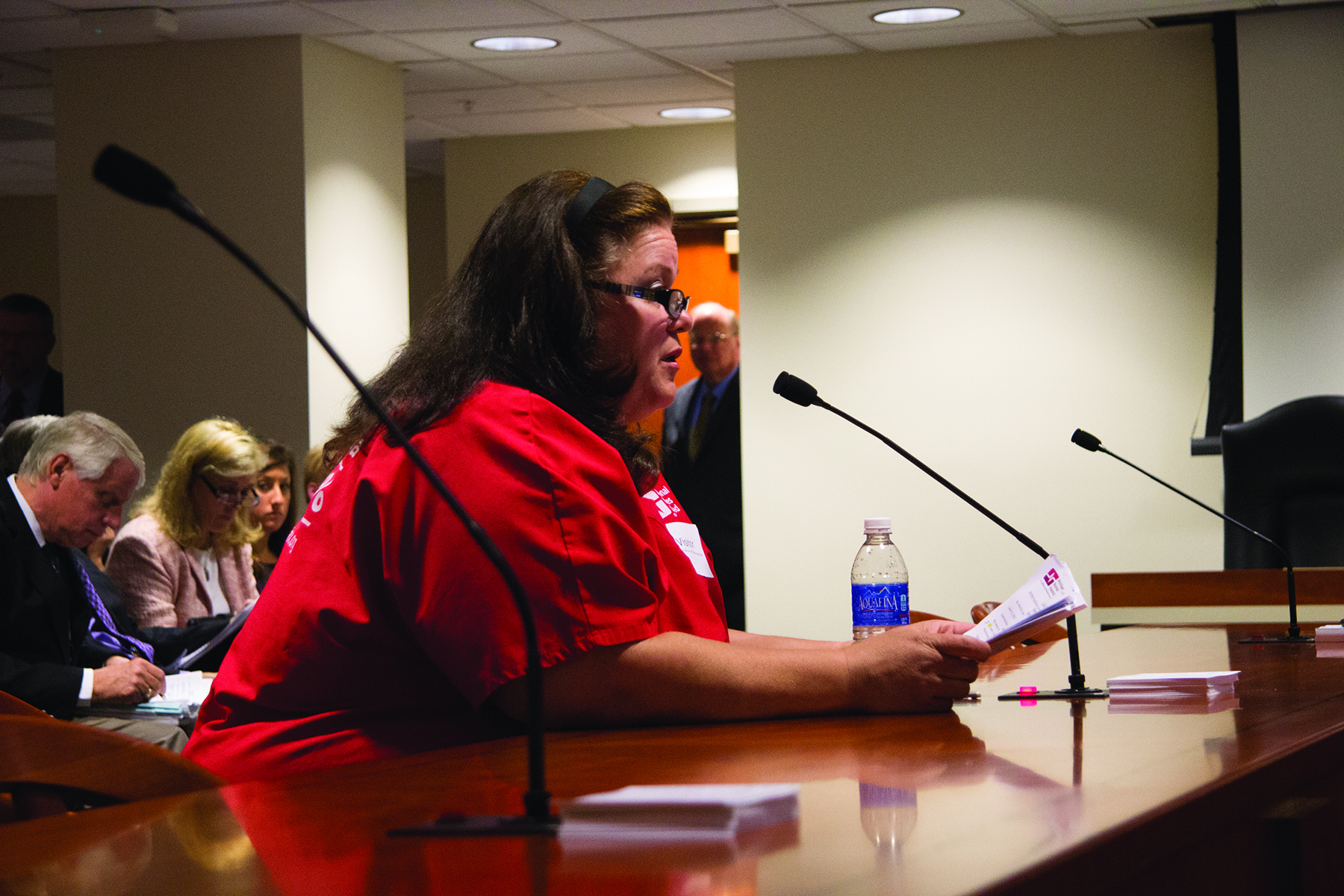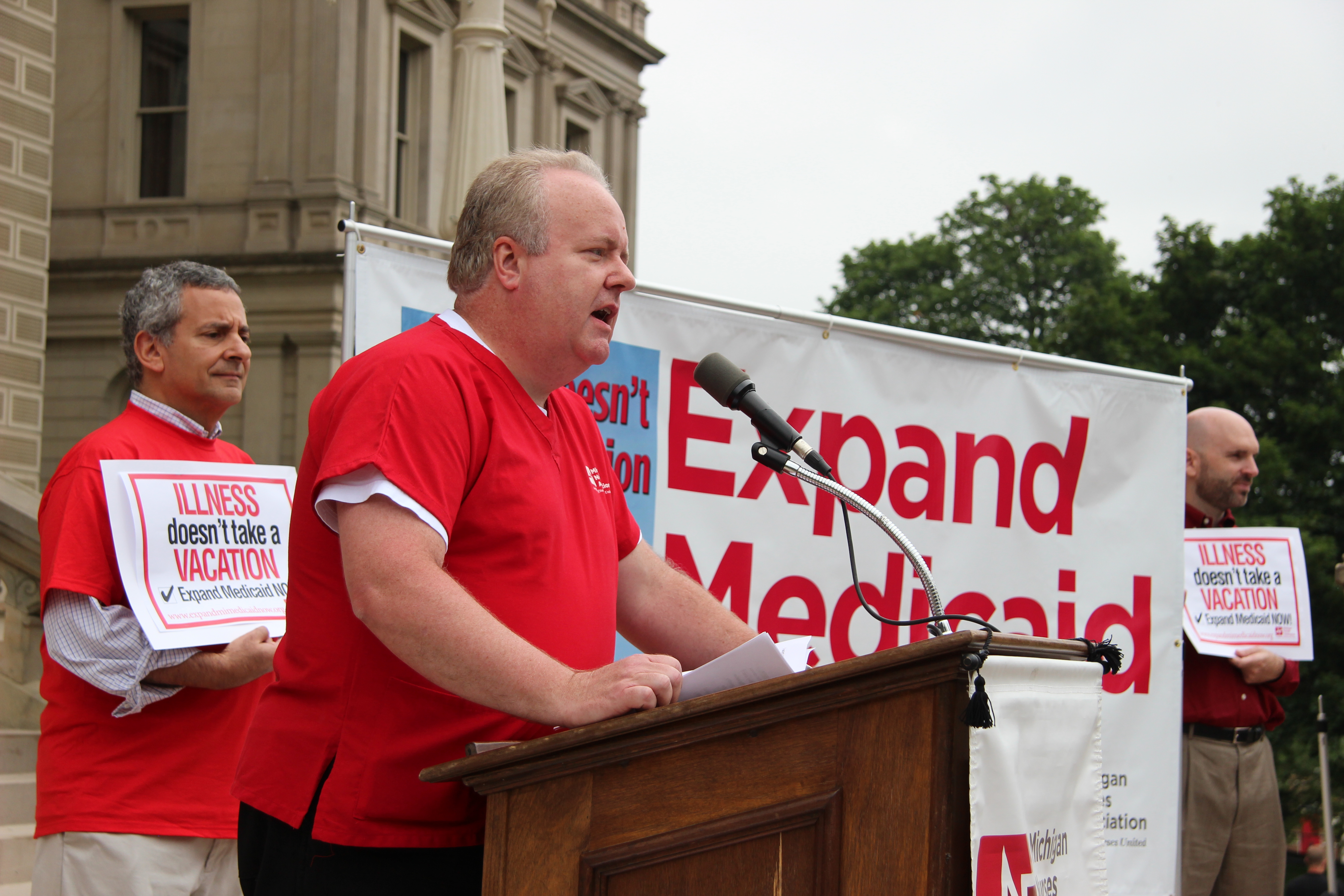Chris already did an excellent job highlighting the significant shortcomings of Sunday’s Detroit News editorial, which essentially asserts that the sky is falling and we’d all better run away from Michigan’s Medicaid expansion program, the Healthy Michigan Plan. If you haven’t read Chris’ piece, you should.
But there’s a sobering omission I had to weigh in on, something that’s left out of the editorial entirely: human beings. The lives of people who are relying on the Healthy Michigan Plan, mostly the working poor who earn far too little to afford health insurance otherwise.
That’s why I’m re-posting this piece I originally published on July 25, 2013, when we were waiting for the Michigan Legislature to decide whether to expand Medicaid in the first place. Because what the editorial ignored — and what I fear our current Legislature may ignore, too, as they nickel and dime our state to death — is the human cost of taking away health insurance from any of the up to 600,000 Michiganders currently covered by the Healthy Michigan Plan.
If the Michigan Legislature takes the irresponsible advice of the Detroit News and ditches Medicaid expansion, lives like the ones I wrote about here will be at stake.
Nurses care, which is why they’re advocating for Medicaid expansion
Whether we can say the same for Michigan Senate Republicans remains to be seen.

While the Senate workgroup congratulates itself for overhauling the Medicaid expansion bill that already passed the Michigan House weeks ago, nurses are working every day with patients who desperately need help getting healthcare coverage.
So desperately, in fact, that some of those patients have died because they didn’t have coverage. And more undoubtedly will die unless Michigan accepts the federal funding offered for Medicaid expansion. It’s estimated that nearly 1,200 Michiganders’ lives would be saved every year through Medicaid expansion.
 I had the privilege of speaking with three members of the Michigan Nurses Association, who shared what they see at work every day and why they’re actively advocating for Medicaid expansion.
I had the privilege of speaking with three members of the Michigan Nurses Association, who shared what they see at work every day and why they’re actively advocating for Medicaid expansion.
Bette O’Connor-Rogers is a registered nurse (RN) from Grand Rapids who provides skilled care to seriously ill patients in their homes. She told me this story, which she also shared when she testified on Medicaid expansion before the Michigan Competitiveness Committee of the State House of Representatives.
I took care of a patient who had always been very self-sufficient. He ate right, exercised, never smoked — he took care of himself. He was a trucker whose employer didn’t offer health insurance, but he figured he was healthy and could do without.Then he started having trouble breathing and when he finally went to the doctor he learned he had a genetic form of lung cancer. If they’d found it sooner, they might have been able to do something. During treatment he went through his entire savings to pay his bills, but when he had nothing left he stopped his chemo and passed away. It’s one of the hardest things I’ve ever had to work through. And Medicaid expansion would have helped him.
The people who need Medicaid expansion the most aren’t trying to game the system. They’re not “moochers” or “takers.” This man did all the right things and met all his financial obligations, but without health insurance he couldn’t get the diagnosis or care he needed.
Senate Republicans really don’t seem to care about any of that. They don’t really seem to want Medicaid expansion at all — they want Medicaid reform. In a press conference on Wednesday the workgroup chaired by Republican Senator Roger Kahn unveiled a draft proposal for a new bill. According to MLive, the new bill is similar to the one approved by an overwhelming majority in the House, with a few exceptions.
Kahn said that the proposal, like the House version, will require two waivers from the federal government allowing the state to re-imagine Medicaid as a ‘hand up’ rather than a ‘hand out.’One waiver would allow the state to enroll individuals in a health savings account and collect income-based premiums, which could be reduced through healthy living. The other would let the state to set a 48-month standard coverage cap for able-bodied adults who earn between 100 and 133 percent of the poverty level. After four years on Medicaid, they could choose to pay increased premiums to remain on the program or use federal tax credits to purchase private coverage on an online exchange.
Did the workgroup forget that a bill with a 48-month coverage limit never made it through the Michigan House? Do they really think that people who can’t afford insurance now will automatically be able to afford it in four years, or that any existing health problems they have will simply disappear? The working poor can’t afford to pay insurance premiums now. A health savings account won’t change that.
The MLive article says the Senate Government Operations Committee is expected to schedule two hearings on the substitute bill next week. The public will be invited to testify. Although the Senate is scheduled to be in session next week, a vote is unlikely despite repeated calls for one from Senate Democrats.
Maybe it’s because there are other proposals being floated by Senate Republicans — ideas that bear no relationship whatsoever to Medicaid expansion.
Senator Patrick Colbeck has presented a counterproposal which, according to an article in Crain’s Detroit Business, he’s been assured will be considered during next week’s hearing. His plan would “move the state’s current Medicaid population into a qualified health plan that features direct primary care services and a high-deductible health plan wrapped within a health savings account.”
More from the Crain’s article:
Under [Colbeck’s] plan, the government would determine whether a person is eligible for assistance in purchasing his or her own commercial health care coverage; if eligible, he or she would receive a coupon for $2,100 […to…] help cover the monthly cost of a high-deductible plan for catastrophic coverage, as well as the monthly fees for a direct primary care service. […]Those between 100 percent and 133 percent of the federal poverty limit, who would receive access to Medicaid under the expansion plan passed by the House, would not see any expansion of coverage under Colbeck’s plan.
But these estimated 450,000 people would be able to more easily afford private health care coverage, because his plan would help lower insurance costs overall, Colbeck said.
 Has Sen. Colbeck not been paying attention? A plan like this wouldn’t have helped the man who died of lung cancer. And it would be out of reach for most of the working poor who can’t afford health insurance now. A $2,100 voucher won’t cover a year’s worth of premiums, let alone the deductible or even out-of-pocket costs for routine check-ups.
Has Sen. Colbeck not been paying attention? A plan like this wouldn’t have helped the man who died of lung cancer. And it would be out of reach for most of the working poor who can’t afford health insurance now. A $2,100 voucher won’t cover a year’s worth of premiums, let alone the deductible or even out-of-pocket costs for routine check-ups.
Steven Strahle, RN, sees working families every day in the ER at Chelsea Community Hospital who can’t pay for even the most basic care.
A mother brought her three-and-a-half-year-old daughter in because she was vomiting and couldn’t keep anything down due to a bug she’d picked up. The mother works two part-time jobs and her husband’s employer only lets him work 39 hours a week, so they don’t have health insurance and couldn’t afford to take her to the doctor.We gave the little girl some fluids and told her mom she’d be okay. We gave her a prescription to help with the vomiting and suggested some foods to get her re-hydrated and eating again. I had to help the mother decide whether to buy the food, fill the prescription or put enough gas in her car to get to work until payday. No one should ever have to make that kind of decision.
I share Strahle’s opinion that it’s “absolutely shameful” that Senate Republicans haven’t moved forward with this bill.
Like many of her fellow members of the Michigan Nurses Association, Carolyn Hietamaki, RN, a wound care nurse at Marquette General Hospital, has been contacting legislators and speaking out at rallies to urge Medicaid expansion.
A lot of people in the U.P. are working two or three jobs and still don’t have insurance — and I see how their health suffers as a result. Senator Tom Casperson only took five days to pass a bill to protect livestock from wolves. But what about the farmers who take care of that livestock? Many of those farmers don’t have health insurance. We need to take care of people first.
All three nurses I interviewed emphasized the benefits of Medicaid expansion. People who get regular preventive care are healthier and miss less work. If they do get sick their illness is caught sooner when it’s easier and less expensive to treat. Everyone pays the price when the uninsured rely on ERs for care, either through higher insurance premiums or cost-cutting measures at hospitals. Pregnant women who can’t get prenatal care run the risk of delivering babies with serious health issues — and who will pay for the care of those children? Those are just a few examples.
I can’t help but continue thinking that the Senate Republican runaround is all for show, so when their bills that put onerous burdens on the working poor are rejected by Michigan Democrats or the federal government, they can throw up their hands and say, “Well, we tried!” And privately gloat that Medicaid expansion didn’t happen.
But we need Medicaid expansion to happen, for the good of our state and its people. You can sign this petition from the Michigan Nurses Association urging Senate Republicans to vote to expand Medicaid now — no more stalling.
Nurses like Hietamaki will continue advocating for Medicaid expansion, just as they advocate for their patients every day.
My passion is my patients and I want to make sure everyone is taken care of. Medicaid expansion is no free ride for anyone. These patients work hard every day just to put food on the table, and the fact that they can’t afford health insurance is a huge injustice.
Watch for updates on the future of the Healthy Michigan Plan in upcoming posts in the remainder of 2015.
[Photos courtesy of the Michigan Nurses Association. Top: Carolyn Hietamaki, RN, at a rally in Marquette. Center: Bette O’Connor-Rogers, RN, testifying before the the Michigan Competitiveness Committee of the State House of Representatives. Bottom: Steven Strahle, RN, speaking at a media event in Lansing.]



